AI Help Desk Statistics for 2024: Key Trends and Data Points
In the dynamic landscape of modern workplaces, providing exceptional employee experience is a key driver of organizational success. The integration of Artificial Intelligence (AI) into the help desk function has emerged as a transformative solution, offering enhanced support, streamlined processes, and improved overall employee satisfaction.
By automating repetitive tasks and providing self-service options, AI Help Desk empowers employees to find solutions to their problems without significant dependencies on human support. This not only saves time but also allows employees to focus on more value-added activities, thereby improving their overall productivity.
Benefits of Implementing AI Help Desk
Implementing AI Help Desk in employee experience brings several benefits. Firstly, it significantly enhances efficiency by providing instant responses to employee queries and enabling self-service options. This reduces the time spent waiting for human support and increases the speed of issue resolution.
Secondly, AI Help Desk improves employee satisfaction by providing personalized and tailored support. Employees feel valued when their individual needs are met, and this contributes to a positive employee experience.
Lastly, AI Help Desk frees up human support agents' time, allowing them to focus on more complex and strategic tasks. Overall, the implementation of AI Help Desk leads to improved employee productivity, satisfaction, and engagement.
Top AI Help Desk Statistics
Companies are investing in AI Help Desk technologies to streamline support processes and improve overall efficiency. The integration of AI-powered chatbots and virtual assistants has become a preferred approach for organizations looking to enhance their employee support capabilities. This trend indicates a shift towards automation and self-service in employee experience management.
Let's take a look at AI help desk statistics:
- The biggest issue with their current helpdesk was repetitive tasks that lowered employee productivity & caused a decline in revenue. (Springworks' Research)
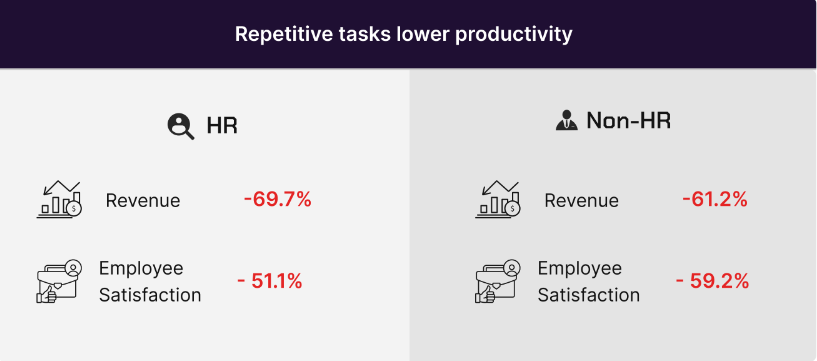
-
13.6% survey respondents from Human Resources said that employees are not comfortable adapting to new technology. (Springworks' Research)
-
Almost 55% of respondents (71% were HR, 29% non-HR) said they were only 'somewhat satisfied' with their current HR/IT helpdesk setup. (Springworks' Research)
-
60.5% of respondents considered using AI for employee experience because the current helpdesk setup is time-consuming, lowers productivity, and leads to a decline in revenue. (Springworks' Research)
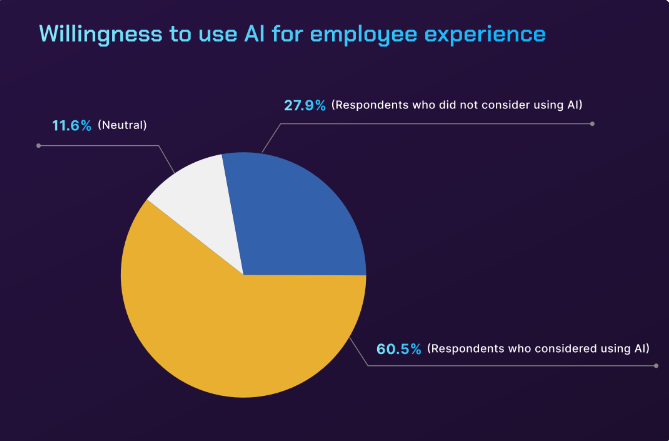
-
Gartner predicts that 75% of HR inquiries will be handled by chatbots and other conversational AI platforms, streamlining processes and enhancing the employee experience. (Gartner)
-
Deloitte predicts that labor productivity could increase by 37% by 2025 due to the impact of artificial intelligence and machine learning. (Deloitte)
-
82% of HR professionals expect improvement in HRBP efficiency as an outcome of adopting AI.
-
HR departments are already recognizing the value of chatbots, with 92% acknowledging their usefulness in guiding employees to the required information. (Servisbot)
-
IBM reports that 66% of HR executives believe chatbots deliver substantial value when it comes to employee engagement. (IBM)
-
69% of executives rate personalized employee experiences via HR chatbots as a high priority. (Deloitte)
-
Companies with a highly effective HR service desk experience a 23% increase in employee productivity. (HDR)
-
Organizations that implement a self-service HR service desk witness a 30% reduction in HR support costs, a 50% decrease in call volume, and a 70% improvement in HR agent's productivity. (Forrester)
-
82% of HR leaders according to McKinsey believe that AI will influence in employee engagement. (Times Tech)
-
Tasks consuming 60 to 70% of an employee's time can be automated with GenAI and other technologies. (McKinsey )
-
81% of HR folks haven't embraced GenAI to handle employee FAQs. (Infeedo)
-
71% of HRs spend the most time on 1:1 chats with employees, while 57% spend ample time answering queries. AI is enabling HR leaders to meaningfully engage with employees and provide personalized experiences at scale. (Infeedo)
Trends and Innovations in AI Help Desk
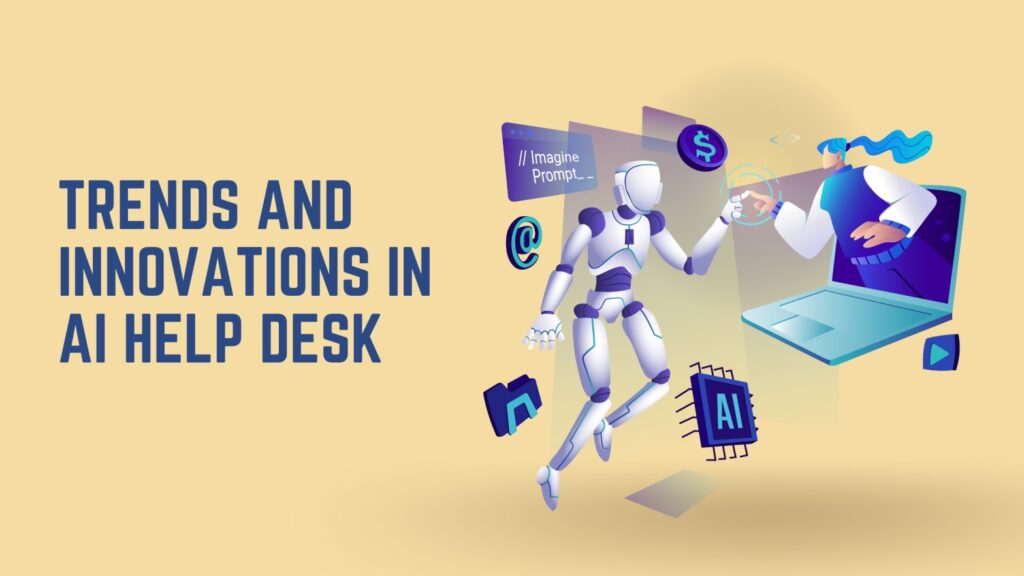
A. Integration of Chatbots and Virtual Assistants in AI Help Desk
Advancements in Chatbot Capabilities for Employee Support
Chatbots are becoming increasingly sophisticated, thanks to advancements in natural language processing and machine learning technologies. They are now capable of understanding complex queries, providing context-aware responses, and even empathizing with employees when necessary. These advancements have resulted in improved user experiences and have positioned chatbots as key components of AI Help Desk solutions.
Virtual Assistants Enhancing AI Help Desk Experience
Virtual assistants are virtual entities designed to assist employees by providing personalized support and guidance. These assistants not only address employee queries but also proactively suggest solutions based on their previous interactions and preferences.
By leveraging AI technologies, virtual assistants play a crucial role in enhancing the overall AI Help Desk experience and providing employees with tailored assistance.
B. Personalization and Customization Features in AI Help Desk
Tailoring AI Help Desk Solutions to Individual Employee Needs
AI Help Desk solutions are increasingly focusing on personalization and customization features to meet the specific needs of employees. By analyzing employees' preferences, work patterns, and historical data, AI Help Desk tools can provide personalized recommendations and solutions.
This level of customization enhances employee engagement and satisfaction by addressing their unique requirements effectively.
Benefits of Personalized AI Help Desk for Employee Engagement
Personalized AI Help Desk solutions contribute to improved employee engagement by fostering a sense of empowerment and ownership. When employees receive customized support that aligns with their individual needs and preferences, they feel valued and motivated. This, in turn, leads to enhanced productivity and a positive employee experience.
C. Cloud-Based AI Help Desk Solutions
Shift Towards Cloud-Based AI Help Desk Platforms
Organizations are increasingly opting for cloud-based AI Help Desk platforms due to their scalability and accessibility. Cloud-based solutions eliminate the need for complex on-premises infrastructure and provide the flexibility to scale as per organizational requirements. Additionally, the cloud enables real-time updates and seamless integration with other cloud-based systems, further enhancing the AI Help Desk experience.
Advantages of Cloud-Based AI Help Desk for Scalability and Accessibility
Cloud-based AI Help Desk platforms offer several advantages. Firstly, they allow organizations to scale their support capabilities based on fluctuating employee demands. For example, during peak periods, additional resources can be provisioned quickly to meet the increased support requirements.
Secondly, cloud-based solutions offer accessibility from anywhere, allowing employees to access support on multiple devices, including smartphones and tablets. This accessibility ensures uninterrupted support and enhances the overall employee experience.
D. Collaboration Between the AI Help Desk and Human Support
Augmentation of Human Support through AI Help Desk
Rather than replacing human support, AI Help Desk solutions are designed to augment the capabilities of support teams. By automating routine tasks and providing self-service options, AI Help Desk frees up human support agents' time, allowing them to focus on more complex and strategic issues.
This collaboration between AI Help Desk and humans ensures a seamless support experience for employees, combining the efficiency of AI with the empathy and critical thinking abilities of humans.
Seamless Integration of AI Help Desk with Existing Support Systems
Successful implementation of AI Help Desk relies on the seamless integration with existing support systems. Organizations aim to create a unified support experience by leveraging both AI-powered technologies and human support. This integration ensures that employees receive consistent and reliable support, regardless of the channel or touchpoint they choose to interact with.
E. Ethical Considerations and Governance of AI Help Desk
Importance of Ethical AI Practices in Employee Experience
As the AI Help Desk becomes more prevalent, ethical considerations become increasingly significant. It is crucial to ensure that AI algorithms are fair, unbiased, and free from any form of discrimination.
Organizations need to adopt ethical AI practices to protect employee rights, privacy, and well-being. Transparency and explainability in AI algorithms are vital to gaining employee trust and maintaining a positive employee experience.
Governing Regulations and Guidelines for AI Help Desk Implementation
Governments and regulatory bodies are developing frameworks and guidelines to govern the implementation of AI Help Desk solutions. Organizations must comply with these regulations to ensure the ethical use of AI technologies. Regulations may include requirements for transparency, accountability, and data privacy.
By adhering to these regulations, organizations can build employee trust and demonstrate their commitment to maintaining ethical and responsible AI Help Desk practices.
Key Facts about AI Help Desk in Employee Experience
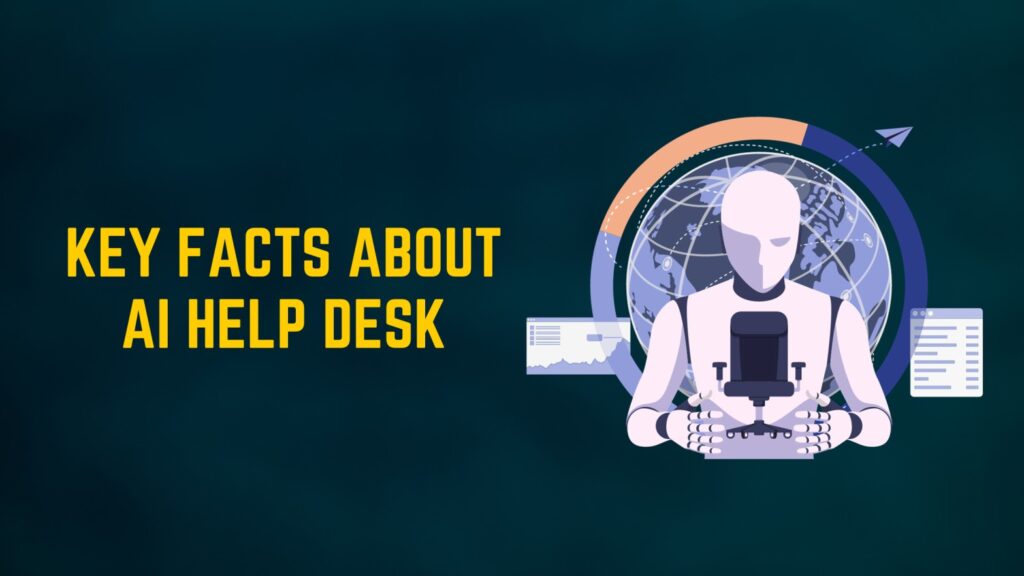
A. AI Help Desk Usage by Different Departments
HR Department and AI Help Desk Integration
The HR department is one of the key areas where AI Help Desk solutions have gained traction. AI-powered chatbots and virtual assistants can provide support for routine HR, such as leave management, benefits administration, and policy inquiries. By automating these tasks, HR teams can focus on strategic initiatives and employee development, ultimately improving the overall employee experience.
AI Help Desk Adoption in IT and Technical Support Functions
IT and technical support departments have also witnessed significant adoption of AI Help Desk solutions. AI-powered chatbots can address common technical issues, provide step-by-step troubleshooting instructions, and even initiate remote diagnostics. This enables faster issue resolution, reduces dependency on IT support agents, and ensures uninterrupted employee productivity.
B. Challenges and Limitations of AI Help Desk in Employee Experience
Addressing Bias and Discrimination in AI Help Desk Algorithms
One of the key challenges in implementing AI Help Desk solutions is ensuring that the underlying algorithms are free from bias and discrimination. AI algorithms learn from historical data, which can unintentionally perpetuate biases present in the data.
Organizations must proactively address this challenge by implementing rigorous testing, monitoring, and continuous improvement processes to eliminate biases and offer fair and unbiased support to employees.
Potential Impact of AI Help Desk on Job Security and Workforce
The introduction of AI Help Desk solutions raises concerns about job security and the impact on the existing workforce. While AI Help Desk automates routine tasks, resulting in increased efficiency, organizations must ensure that employees are reskilled and upskilled to perform more complex and strategic roles. By proactively addressing these concerns and involving employees in the transition, organizations can alleviate fears and foster a positive work environment.
C. ROI and Cost Savings with AI Help Desk
Financial Benefits of Implementing AI Help Desk in Employee Experience
Organizations that have implemented AI Help Desk solutions have reported significant cost savings. By automating routine tasks and minimizing the need for human support, organizations can reduce support costs while improving overall efficiency. The financial benefits include reduced support ticket volumes, lower labor costs, and increased employee productivity, resulting in a positive return on investment (ROI).
Comparison of AI Help Desk Costs to Traditional Support Systems
While AI Help Desk solutions require initial investments in technology and implementation, the cost savings over time outweigh the initial expenses. AI Help Desk eliminates the need for additional support staff to handle routine tasks and reduces the risks of costly errors. When compared to traditional support systems, AI Help Desk offers a more cost-effective and efficient solution for managing and enhancing employee experiences.
How Can Chat Aid Help You?
Chat Aid is your team's intelligent universal search tool that functions on Slack/web & integrates with the knowledge portals of your choice (Notion, Slack, Jira, Google Drive, etc.).
Just prompt Chat Aid – it can give you any information you need, essentially replacing repetitive and time-consuming employee-HR interactions.
Think of Chat Aid as a central source of truth for you, providing instant and accurate information in ChatGPT style without waiting on anyone.
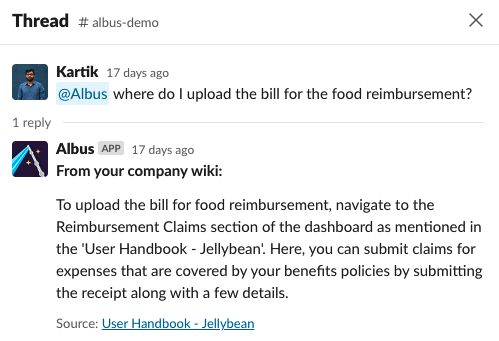
What Chat Aid can do for you:
-
Give you a 360∘ view of all your operations
-
Multiple use cases, from employee helpdesk to customer success to project management
-
Instant and accurate resolution of queries
Conclusion
The future of AI Help Desk in employee engagement is promising. Advancements in AI technologies will continue to enhance the capabilities of chatbots and virtual assistants, further improving the support provided to employees. AI Help Desk will become more seamlessly integrated with existing support systems, ensuring a unified
